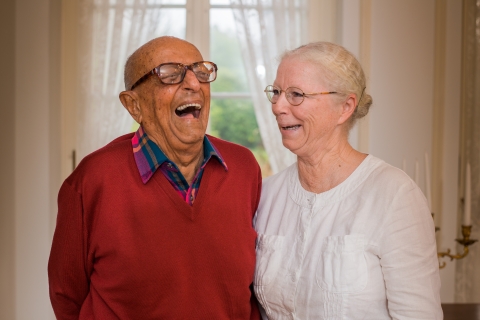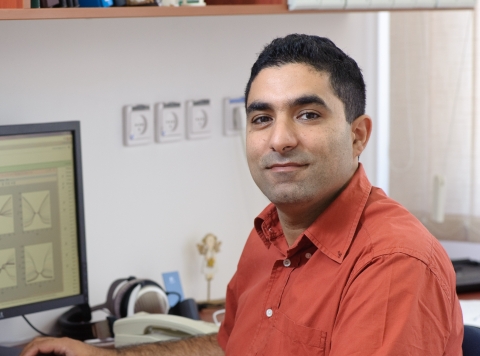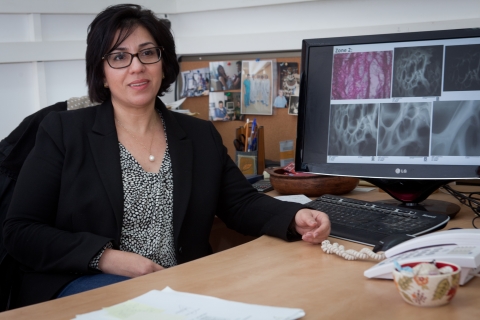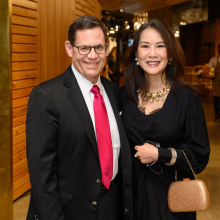Dimitris N. Chorafas
Advisor, author, thinker, philanthropist
People behind the science

Loss of a dear friend: Weizmann Magazine interviewed Dr. Dimitris Chorafas shortly before his passing in November. To honor his memory, we have left the article intact as he approved it.
Dr. Dimitris N. Chorafas likes to say that “the most expensive thing in life is low quality” as it relates to industrial products and all sorts of services, including social services. He would know, as an engineer and long-time international financial advisor to some of the most prestigious global companies including IBM, General Electric, and many European banks. But he’s also careful to point out that that goes for education too.
It is precisely this keen interest—a preoccupation, really—with educational excellence, conveying knowledge and wisdom to the next generation, and investing in the right people at the right time that characterizes Dr. Chorafas—and which led him to the Weizmann Institute of Science. A native of Greece who now resides in Switzerland and France, Dr. Chorafas, who is 88, recently gave a transformational gift to the Weizmann Institute to establish the Chorafas Institute for Scientific Exchange. The new entity will fund about 10 scientific conferences every year at the Weizmann Institute in a wide variety of areas of investigation.
“The Chorafas Institute will amplify our capabilities to bring together scientific leaders from around the world here at the Weizmann Institute, reinforcing and strengthening the Institute as a hub of scientific research,” says Prof. Israel Bar-Joseph, Vice President for Resource Development and Public Affairs, and Dean of Education.
Chorafas’s relationship with the Institute goes back nearly two decades, and the recent gift reflects a commitment to the Weizmann Institute that has grown and developed over that time.
Badge of confidence
In 1992, in collaboration with the Swiss Academies of Sciences, Dr. Chorafas established a foundation to reward the best scientists chosen by the correspondent academies of sciences in Western countries. Four years later, the Dimitris N. Chorafas Foundation of Switzerland began awarding merit-based financial prizes to outstanding science students completing their doctoral studies at about two dozen academic institutions around the world. The concept was that the prizes would encourage cream-of-the-crop students at the best universities to invest themselves in science, expand our understanding of the world, and lay the groundwork for future discoveries. The Chorafas Foundation has distributed awards of up to $5,000 to hundreds of students at partner institutions in the US, UK, Canada, Japan, China, France, Germany, Italy, Greece, Switzerland and Israel. Today, it has 21 partner institutions; seven other institutions were partners in the past.
Nearly two dozen Weizmann Institute doctoral candidates have received the Chorafas Prize since it was launched. It is considered one of the most prestigious prizes offered by the Feinberg Graduate School. Past recipients include Dr. Shahal Ilani, Prof. Omer Reingold, Prof. Nirit Dudovich, and Prof. Ron Milo, all faculty members of the Institute today.
“What I found over the years was that, among all these excellent students, the Weizmann students were really the most impressive,” says Dr. Chorafas, who has historically reviewed the candidates’ profiles for selection himself, in cooperation with his board. In fact, for that reason, in recent years the Chorafas Foundation asked the Feinberg Graduate School to serve as an official advisor to the foundation in its annual selection process of all candidates worldwide, in an effort to ensure the prizes go to the most promising future scientists.
The goal of the prizes is to reward exceptional performance and encourage significant future contributions to science and technology. “Getting the Chorafas Prize as a young student made me feel that I was now playing in the real league of the ‘grown-ups,’” recalls Prof. Milo of the Department of Plant and Environmental Sciences, who received the award in 2004. “Such a recognition of the work done at Weizmann clarified to me what we were doing here was on par with anywhere else in the world. It was the right boost at the right time for me and propelled me forward in deciding to make a career in basic science research.”
A vibrant, intellectual life
Dimitris Chorafas was born in Greece in 1926. He volunteered for the government army during Greece’s civil war (1944–49). The army—backed by Great Britain and the U.S.—fought against the military branch of the Greek communist party, which was backed by the Soviet Union and several eastern European countries. It was one of the first conflicts of the Cold War. To this day, Chorafas has 14 pieces of shrapnel in his body from a grenade that exploded nearby him. His most salient memory was from Christmas night in 1944, when he found himself and fellow volunteer Greek soldiers encircled in a factory near Athens with only provision bullets, whiskey and crackers. Communist forces were all around. Everyone in his group was untrained. Chorafas said they survived thanks to downing the factory’s whisky, which settled their nerves and gave them the guts to shoot.
After the war, he received his bachelor’s degree in electrical and mechanical engineering from the National Technical University of Athens, and went on to be a Fulbright Scholar. He received an MSc in computers from UCLA and a Doctor of Science in mathematics and logic at the Sorbonne in Paris. He did postgraduate studies in banking, finance and operations research at UCLA, the University of Denver, and George Washington University. He joined the faculty of The Catholic University of America in Washington D.C. Then he moved onto the business world, where he helped establish IBM’s Applied Science departments in Europe and was Director of Management Information Systems at Booz, Allen and Hamilton International, the consultancy. Following these affiliations, as an independent management consultant, he advised banks including the Union Bank of Switzerland and corporations including Honeywell, Univac, Nestlé, and the National Iranian Oil Company. Yet he always remained closely tied to academia, serving as a visiting professor at École Polytechnique Fédérale de Lausanne (EPFL) and head of information systems at the École d’Etudes Industrielles of the University of Geneva.
One of the seminal themes in Chorafas’s life has been his thirst for knowledge, and, in parallel, his quest to disseminate it. He is a voracious reader with a phenomenal memory, and an unusual ability to synthesize information and clearly analyze it. He is a prolific writer, having published 165 books to date; his 166th, on business ethics, is to be published in 2015. His titles focus on a wide range of issues including research and development, reliability engineering, risk management and finance.
His lifelong partner, Eva Maria Binder, who is from Germany, serves as his editor and proofreader, working passionately and tirelessly on his behalf and serving as a liaison with publishers. Chorafas has a rare dexterity with names and sayings of philosophers, political leaders, and intellectuals. Among those he appreciates most are Golda Meir and Abba Eban. He has distant Jewish roots, but he was drawn to Eban— who was briefly President of the Weizmann Institute—and Meir because of their words. (Chorafas’s paternal grandmother was Jewish, and his mother’s lineage traces back to Spain, from which his ancestors fled to the Greek islands having faced persecution during the Inquisition.) An adamant proponent of self-responsibility and disdain for reliance on governments, he says that “Golda Meir said it best: that governments cannot do everything and they shouldn’t do everything.”
He worries about high expectations from governments to provide solutions in an era of dwindling budgets and burgeoning deficits. “The role of philanthropy is to step in and infuse funds into research,” he says, “so that societies can help themselves. Philanthropy is an enabler, laying the groundwork so people can learn, grow, and create change.” Meanwhile, as a computer engineer, he developed a keen sense of the value of basic research as a foundation for applied science and technology.
The Chorafas Institute for Scientific Exchange
Chorafas’s decision to fund intellectual exchange at the Weizmann Institute through the Chorafas Institute for Scientific Exchange was a natural outgrowth of his own commitment to the pursuit and sharing of knowledge, and to basic research. Importantly, he adds, with the closure of major private, industrial research laboratories across the U.S. and Europe in recent decades, basic research is now being carried out almost exclusively at academic institutions. “A major source of basic research discoveries has nearly totally disappeared, and if research retreats, entire societies will retreat,” he says. The Chorafas Institute will enable small conferences of up to 300 top-notch scientists, postdocs, and students, around a single scientific topic on campus. The gift funds conferences that will take place at The David Lopatie Conference Centre.
One of his inspirations for establishing the Chorafas Institute was the Rothschild-Weizmann Program for Excellence in Science Teaching at the Weizmann Institute. The program offers MSc degrees in science and math to experienced high school teachers from all over Israel. The concept: a ‘trickle-down’ effect that will benefit students. The conferences his new Institute will support will have a similar impact, he says, “by generating knowledge that will be shared with others, and will positively affect science for decades, and generations, to come.”
The Chorafas Prize
The Chorafas Prize is one of the Feinberg Graduate School’s most prestigious prizes, awarded to the most outstanding students in any given year. “There is no doubt that in selecting the candidates for this award, we have always sought out the most promising students and individuals, and we see years later that these exceptional students do become scientists who are leaders in their fields,” says Prof. Irit Sagi, Dean of FGS. Prof. Sagi leads an FGS committee which serves as a formal advisory body to the Chorafas Foundation which reviews the candidates in all 21 partner institutions worldwide for the Chorafas Prize.
Prize student
One of the most recent recipients of the Chorafas Prize is Dr. Liron Barak, who completed her PhD studies in physics under the guidance of Prof. Eilam Gross in the Department of Particle Physics and Astrophysics. Dr. Barak, who is married and a mother of three, started a prestigious postdoctoral fellowship at CERN in Geneva as part of her research on the Higgs boson. Prof. Gross, who played a leading role in the 2012 discovery of the Higgs boson at CERN, calls Dr. Barak “an exceptional talent, and therefore it is very fitting that she is a recipient of the prestigious Chorafas Prize.” Dr. Barak says it was a “huge honor” to be named a recipient of the prize, and it validated her chosen career path as a research scientist.

Dimitris Chorafas with his partner, Eva Maria Binder


Prof. Ron Milo (top) and Dr. Shahal Ilani (bottom) are among the previous recipients of the Chorafas Prize

Prof. Irit Sagi








